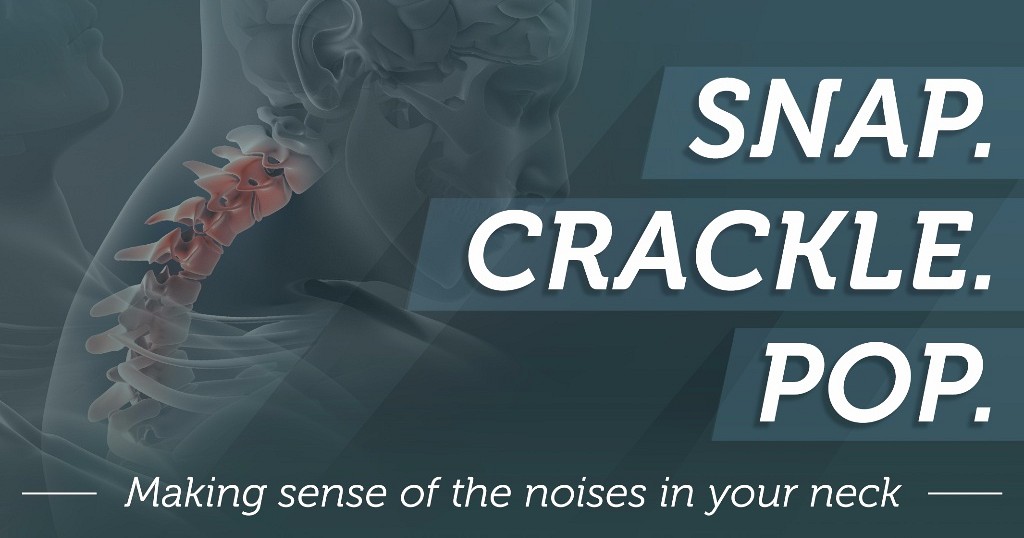Do you notice strange sounds coming from your neck – like snapping, crackling, or popping? Wondering if they’re normal or if they signal something more serious?
You’re not alone. One of the most common questions we hear in the clinic is: “Should I be worried about the noise in my neck?”
Let’s break it down using a familiar phrase from your breakfast table: Snap. Crackle. Pop. Each sound has its own cause – and its own story to tell. But to understand what’s really happening, it helps to first look at how your neck is built.
Let’s Break Down Neck Anatomy
The neck, or cervical spine, is made up of seven vertebrae (C1 to C7) stacked atop each other, forming the uppermost portion of your spine. These vertebrae are separated by discs and connected by joints, ligaments, and muscles. Your neck also houses critical nerves that extend into your shoulders and arms. The movement of bones, tendons, ligaments, and neck muscles all contribute to the sounds you may hear — and understanding this anatomy can help explain why you might experience neck crepitus, cracking sounds, or discomfort. In many cases, these noises are caused by movement within the neck joints or changes in pressure inside the joints themselves.
Snapping
If you look at an image of the cervical spine, you’ll see seven individual vertebrae (labeled C1 through C7). Each vertebra has bony projections that serve as anchor points for tendons and ligaments.
Tendons connect muscles to bone. Ligaments connect bone to bone, helping stabilize your neck. When you move, these soft tissues can rub over those bony points, creating a snapping sound.
This is usually normal and painless. The sound often happens when turning your head or stretching your neck. While snapping can occasionally feel awkward – or even refer pain into the shoulder – it typically resolves on its own as your tendons and ligaments adapt to movement.
Crackling
As we age, our joints naturally lose lubrication and cartilage. This includes facet joints in your neck, which sit between each of the seven cervical vertebrae.
When these joints move, they glide past one another. But with wear and tear, they may begin to grind, causing a crackling sound. Think of it like creaky knees – just higher up.
If this noise isn’t accompanied by pain, there’s usually no cause for concern. But if you notice increased discomfort, stiffness, or reduced motion, a physical therapist can help assess your joint health and recommend treatment.
Research shows that physical therapy is one of the most effective approaches for managing chronic neck pain. Tailoring exercises to individual needs can significantly improve outcomes. Learn more about evidence-based exercise therapy for chronic neck pain.
Popping
Here’s the one most people recognize – whether you’ve done it yourself or heard someone else do it. That loud pop when someone twists or stretches their neck? That’s known as cavitation, and it’s completely natural.
Inside your facet joints is a fluid called synovial fluid, which lubricates and protects the joint. When you stretch the joint to its end range, gas bubbles can form and quickly collapse – producing a popping sound.
Popping caused by cavitation is not dangerous, but there’s a caveat. Forcefully cracking your own neck – especially with quick, jerky movements – can overstretch ligaments and cause strain. If you’re a frequent “self-popper,” go slow and be gentle. Or better yet, talk to a professional first.
Treating or Preventing Neck Crepitus
If you’re experiencing frequent neck crepitus or cracking sounds that come with pain, stiffness, or nerve symptoms, it’s time to take action. Persistent neck popping may not be inherently bad, but it could signal underlying issues in your neck joints, posture, or muscles. Poor posture and weak support from neck muscles can cause neck cracking to occur more often and with greater discomfort.
A licensed physical therapist can evaluate the root cause of your symptoms and tailor a treatment plan to relieve pressure, improve posture, and strengthen key support muscles. Common strategies may include manual therapy, stretching, postural training, and targeted neck muscle activation. In more severe cases where structural damage or swelling is present, further healthcare evaluation, including imaging or surgical consultation, may be warranted.Early intervention and personalized care are essential to prevent long-term pain, nerve issues, or the need for more invasive treatment later on. Don’t wait for things to get worse — if you’re experiencing uncomfortable grinding, cracking, or popping, there are safe and effective ways to feel better.
When to Get Checked Out
Here’s the bottom line: Noises like snapping, crackling, and popping in the neck are usually harmless. But if you’re noticing other symptoms alongside the noise, it’s a good idea to check in with a professional. Watch for:
- Pain that doesn’t go away
- Dizziness or frequent headaches
- Tingling or numbness in your arms or hands
- Stiffness or trouble turning your head
Our physical therapists specialize in assessing neck pain, movement issues, and joint health. Whether you’re dealing with new symptoms or something that’s been building for a while, we’re here to help you feel better and move better with treatments such as soft tissue mobilization..
Ready to Find Relief?
Request an appointment at a nearby Ivy Rehab Physical Therapy location – no prescription required in most states.
Live in a state with limited direct access laws? No problem. You can still come in for a free consultation. Let’s work together to keep your neck happy, healthy, and noise-free!
Aaron Gewant, PT, MSPT, cert MDT
Ivy Rehab of Chester, New Jersey





